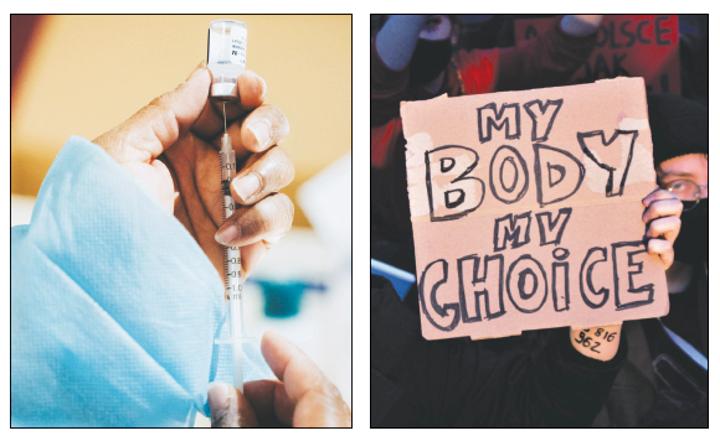Africa-Press – Namibia. MANY unvaccinated employees at various workplaces in Namibia fear losing their jobs. This is since some employers are enforcing getting vaccinated against Covid-19 despite president Hage Geingob’s recent reassurance that vaccination remains voluntary.
Both Geingob and attorney general Festus Mbandeka last week said businesses, however, reserve the right to enforce mandatory vaccination against Covid-19 provided they can substantiate their decision in line with the provisions of the Labour Act.
Some companies are allegedly asking unvaccinated employees to take unpaid leave, while others have allegedly told workers not to show up at work if they cannot produce a vaccination card.
Other workers allegedly stand to lose perks such as a 13th cheque. Masterparts, a vehicle parts company in Windhoek, said in a letter sent to staff on 22 August that being vaccinated would be taken into account with the paying of year-end bonuses.
The letter further set a vaccination deadline of 15 November, which is when bonuses will be finalised. The company’s human resources representative at its South African headquarters, Rayno Pretorius, says although vaccination is not mandatory, the company requires that its workers are vaccinated.
He says bonuses are awarded on a discretionary basis. “As the law becomes clearer, we may decide to make vaccination mandatory,” Pretorius says. Another company, the United Africa Group, has given its workers until 30 September to comply with its vaccination policy.
“Please note there shall be no other extension granted.
Kindly take note that the company reserves its legal rights should employees fail to adhere to the Covid-19 policy,” a letter seen by The Namibian states.
The letter was signed by group chief executive officer Willem Mouton on 14 September. Company spokesperson Haliema Kyababa on Friday said she cannot comment on the company’s internal policy.
Liana Vermeulen, who responded to a call by The Namibian for readers on social media to share their experiences, says her company, a tourism establishment, at first asked employees to consider getting vaccinated.
“At first, no one went. Then another letter came out saying it is our choice but workers will be retrenched,” she says.
This was followed by some workers being retrenched, Vermeulen says. “Three left at one lodge. They were retrenched because they did not want to get the jab. When the second letter came I started looking for another job because I didn’t want the vaccine,” she says.
A letter sent by the lodge’s chief operating officer reads: “Managers must please make it clear that should someone not be vaccinated by 15 June their employment will be terminated, and that person will never be employed again by [this company].
” The company told employees that tourists will only stay at accommodation sites with fully vaccinated staff members, Vermeulen says.
Anita Nel, who also responded on social media, says her husband, who is unvaccinated, is not allowed to access the office canteen. “They play games on Fridays and [the unvaccinated] are not allowed to participate.
They are also not allowed to take sick leave, but must rather use their annual leave. As a result only a few are not vaccinated,” she says. Nel says the company informed employees more than a month ago that it was drafting a mandatory vaccination policy.
“People have issues including blood clotting and high blood pressure. It should be their choice,” she says. COMPLAINTS The Ministry of Labour, Industrial Relations and Employment Creation says it has received a few complaints regarding the matter.
“All received complaints were resolved amicably by and between the affected employees and employers after receiving relevant advice,” the ministry’s acting executive director, Lydia Indombo, says.
She says the government wants people to get vaccinated to ensure health and safety at the workplace. People’s Litigation Centre chairperson Mathias Haufiku says forced vaccination is misplaced.
He says the centre is of the view that forced vaccinations are contrary to human rights enshrined in the Constitution. As a result, he says the centre calls on the government to intensify education campaigns to allay people’s fears.
“The prevailing trend of shunning those who harbour concerns around the vaccine will not yield the desired results,” Haufiku says. He says public safety should be weighed up against personal choice.
“We cannot allow a system which points a gun at its people, nor can we allow a situation where individual choices threaten public safety, hence the solution should be consultative and mutually beneficial,” he says.
BALANCING ACT The Namibia Chamber of Commerce and Industry (NCCI) says efforts by businesses to safeguard the health and safety of their staff and others, such as customers, should not disregard the rights of employees.
NCCI chief executive officer Charity Mwiya urges employers to educate their staff on the benefits of heeding the advice of medical professionals and scientists, but to avoid confrontation by enforcement.
“We, however, cannot let our economy continue to suffer, as small business owners in particular worry about what is next. The business community can play a leading role in vaccination efforts,” she says.
“When businesses achieve a high vaccination rate, it signals that a workplace is a safe, healthy environment for employees, employers and customers,” Mwiya says.






